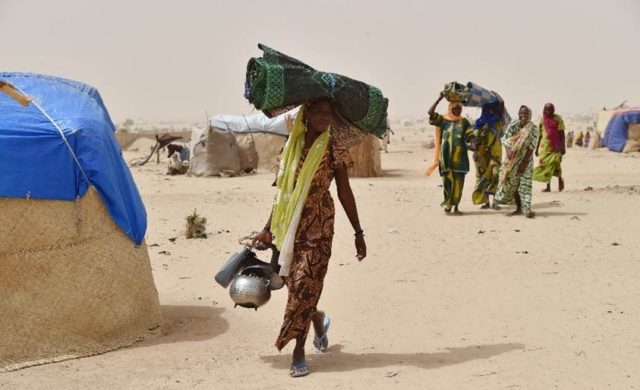AFP – The number of refugees and others fleeing their homes worldwide has hit a new record, spiking to 65.3 million people by the end of 2015, the United Nations said Monday.
Europe’s high-profile migrant crisis, its worst since World War II, is just one part of a growing tide of human misery led by Palestinians, Syrians and Afghans.
Globally, approaching one percent of humanity has been forced to flee.
“This is the first time that the threshold of 60 million has been crossed,” the UN refugee agency said.
The figures, released on World Refugee Day, underscore twin pressures fuelling an unprecedented global displacement crisis.
As conflict and persecution force growing numbers of people to flee, anti-migrant political sentiment has strained the will to resettle refugees, said UNHCR chief Filippo Grandi.
“The willingness of nations to work together not just for refugees but for the collective human interest is what’s being tested today,” he said.
– Unprecedented risk –
The number of people displaced globally rose by 5.8 million through 2015, according to the UN figures.
Counting Earth’s population at 7.349 billion, the UN said that one out of every 113 people on the planet was now either internally displaced or a refugee.
They now number more than the populations of Britain or France, the agency said, adding that it is “a level of risk for which UNHCR knows no precedent.”
Displacement figures have been rising since the mid 1990s, but the rate of increase has jumped since the outbreak of Syria’s civil war in 2011.
Of the planet’s 65.3 million displaced, 40.8 million remain within their own country, while 21.3 million have fled across borders and are now refugees.
Palestinians are the largest group of refugees at more than five million, including those who fled at the creation of Israel in 1948 and their descendants.
Syria is next on the list, with 4.9 million refugees, followed by Afghanistan (2.7 million) and Somalia (1.1 million).
– Rising conflict, shrinking solutions –
A worrying mixture of worrying factors have led to rising displacement and narrowing space for refugee resettlement.
“Situations that cause large refugee outflows are lasting longer,” the agency said, including more than 30 years of unrest in both Somalia and Afghanistan.
New and intense conflicts as well as dormant crises that have been “reignited” are further fuelling the crisis, UNHCR said, pointing to South Sudan, Yemen, Burundi and the Central African Republic, aside from Syria.
Beyond the refugee hotspots in the Middle East and Africa, UNHCR said there were also worrying signs in Central America, where growing numbers of people fleeing gang violence led to a 17 percent rise in those leaving their homes through 2015.
Faced with a growing need to resettle those facing persecution, the answers are not always obvious.
“The rate at which solutions are being found for refugees and internally displaced people has been on a falling trend since the end of the Cold War,” the UN agency said.
Jan Egeland, head of the Norwegian Refugee Council and a senior UN diplomat, said refugees “are the victims of a general paralysis” among nations who are not meeting their responsibilities to the world’s neediest.
Turkey – which struck a controversial deal with the European Union in March to stem Europe’s migrant crisis – hosted the highest number of refugees through 2015 at 2.5 million, mostly Syrians.
Germany received the highest number of asylum requests (441,900) over the 12-month span, demonstrating the country’s “readiness to receive people who were fleeing to Europe via the Mediterranean.”

COMMENTS
Please let us know if you're having issues with commenting.